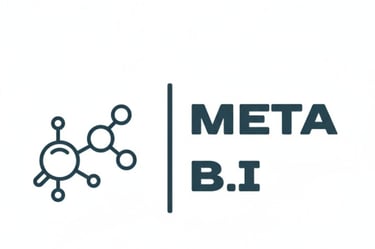Complete Guide: Tableau to Power BI Migration in 2025
A comprehensive guide targeting organizations using Tableau who are considering migrating to Microsoft Power BI. The article positions Power BI as a more cost-effective alternative that offers better Microsoft ecosystem integration and AI capabilities.
9/11/20254 min read


Master the transition from Tableau to Microsoft Power BI with proven strategies that slash costs by up to 75% and fast-track your BI replatforming.
The era of Tableau as the dominant visualization tool is evolving, with many organizations finding its high costs and limited integration capabilities no longer align with modern needs. Businesses are turning to Microsoft Power BI for a more cost-effective, AI-enhanced alternative that seamlessly integrates with existing Microsoft ecosystems.
At MetaBI, we've analyzed enterprise BI migrations, revealing a clear trend: lower costs, superior scalability, cloud-native functionality, and AI-driven analytics that Tableau struggles to match at scale.
Here's your complete guide to navigating a Tableau to Power BI migration in 2025, with MetaBI's proven framework to ensure a seamless, cost-effective transition.
Why Migrate from Tableau to Power BI in 2025?
Tableau excels in data visualization, but it's increasingly challenged by demands for affordable self-service analytics, real-time insights, deep Microsoft integration, and advanced AI. Power BI delivers these while addressing Tableau's pain points, making it the preferred choice for cost-conscious enterprises.
The Tableau Cost Crisis
Tableau's licensing fees are a major hurdle for scaling. Based on current pricing, Tableau Viewer licenses start at $15 per user per month, Explorer at $42, and Creator at $70–$75 (billed annually). In contrast, Power BI Pro is $14 per user per month, and Premium Per User is $24 (effective April 2025). This can translate to significant savings—up to 75% on licensing alone for mid-sized teams. These savings extend beyond licensing, thanks to Power BI's streamlined cloud-native architecture reducing IT overhead.
User Experience Gap
Tableau's interface is powerful for complex visuals but often requires specialized skills, leading to IT bottlenecks. Power BI's intuitive, Excel-like design allows business users to create reports faster, fostering self-service and reducing dependency on technical teams.
Technical Limitations
Tableau performs well for on-premises or hybrid setups but lags in native integration with Microsoft tools like Azure and Office 365. Power BI, built for the cloud, handles large datasets, real-time streaming, and AI features more efficiently, especially in Microsoft-centric environments.
The Risks of Delaying Your Migration
Clinging to Tableau isn't just about forgoing Power BI's innovations—it's about building technical debt and missing competitive advantages:
Escalating Costs: Tableau's tiered licensing and add-ons inflate budgets as user bases grow.
Innovation Lag: Competitors leverage Power BI's AI (like Copilot for automated insights) for quicker decisions.
Talent Challenges: Data analysts favor Power BI's familiarity with Microsoft tools, complicating Tableau recruitment.
Vendor Shifts: Salesforce's ownership of Tableau has raised concerns about future pricing and focus.
The MetaBI 4-Step Tableau to Power BI Migration Framework
At MetaBI, we've guided organizations through successful Tableau to Power BI migrations, leveraging our proprietary automation to achieve 85% accuracy and complete projects in a fraction of the time. For example, manually migrating 1,000 reports can take 15 technicians 10 months, while MetaBI's automated solution completes the same project in less than 3 months with a leaner team. Here's our proven framework:
Step 1: POC
Proof of concept to demonstrate migration feasibility and validate our automated solution with a representative sample of your BI landscape.
Step 2: Assessment
Comprehensive analysis of migration scope, technical complexity, and resource allocation. Based on this assessment, we deliver a detailed project roadmap and accurate quotation.
Step 3: Automated Migration
Execution of the migration with our automated solution and expert supervision.
Step 4: Reconciliation
Data validation and reconciliation process to ensure accuracy and integrity of migrated reports and dashboards.
Overcoming Common Migration Challenges
Tableau to Power BI migrations present specific obstacles, but MetaBI's expertise minimizes risks:
Data Compatibility Issues: Differences in data models and functions can cause inconsistencies; we use automation to map and convert seamlessly.
Visual Customizations: Some Tableau-specific visuals don't translate directly; our tools recreate them in Power BI while preserving functionality.
Security Model Migration: We adapt Tableau's role-based access to Power BI's row-level security and workspaces.
Data Quality and Performance: Large datasets (e.g., 150GB+) require optimization; we implement governance to resolve hidden issues.
The ROI of Tableau to Power BI Migration
Migrating to Power BI yields tangible returns, backed by real case studies:
Cost Savings
40–75% reduction in annual licensing costs, with some achieving 70% overall BI expense cuts.
50–60% decrease in infrastructure expenses through cloud efficiencies.
20–50% reduction in IT support overhead via self-service and automation.
Productivity Gains
Up to 10x faster report creation with Power BI's intuitive interface and frequent updates.
70–90% increase in self-service analytics adoption, empowering more users independently.
40–73% reduction in IT report backlog and migration timelines.
Strategic Benefits
Seamless Office 365 and Azure integration.
AI-driven insights via Azure Cognitive Services.
Mobile-first design for anywhere access.
Foundation for predictive analytics and machine learning.
Why Choose MetaBI for Your Migration?
At MetaBI, we specialize in Tableau to Power BI migrations, delivering unparalleled speed and precision:
Secure Processing: On-premises tools ensure your data stays safe.
Rapid Results: Complete migrations in less than 3 months vs. 10 months for manual processes.
End-to-End Support: From assessment to reconciliation, we manage every step.
Start Your Migration Journey Today
The question isn't if you should migrate from Tableau to Power BI—it's how fast you can unlock its benefits. Organizations that act now gain a competitive edge, while those that delay face rising costs and diminishing returns.
MetaBI's automated migration platform eliminates the risks and inefficiencies of manual processes. Our proven approach ensures a smooth transition, preserving your business logic while unleashing Power BI's full potential.
Ready to break free from the Tableau cost trap? Visit www.themetabi.com to schedule a demo of your Tableau environment and discover how much you can save with Power BI. Take the first step toward a modern, cost-effective BI future today!
Services
Ressources


Contact
Expert in automated BI migration
Cognos & Tableau to Power BI
QUINTESYS TECHNOLOGIES PVT LTD
2024 Meta BI - Quintesys Technologies. All rights reserved. Privacy Policy
